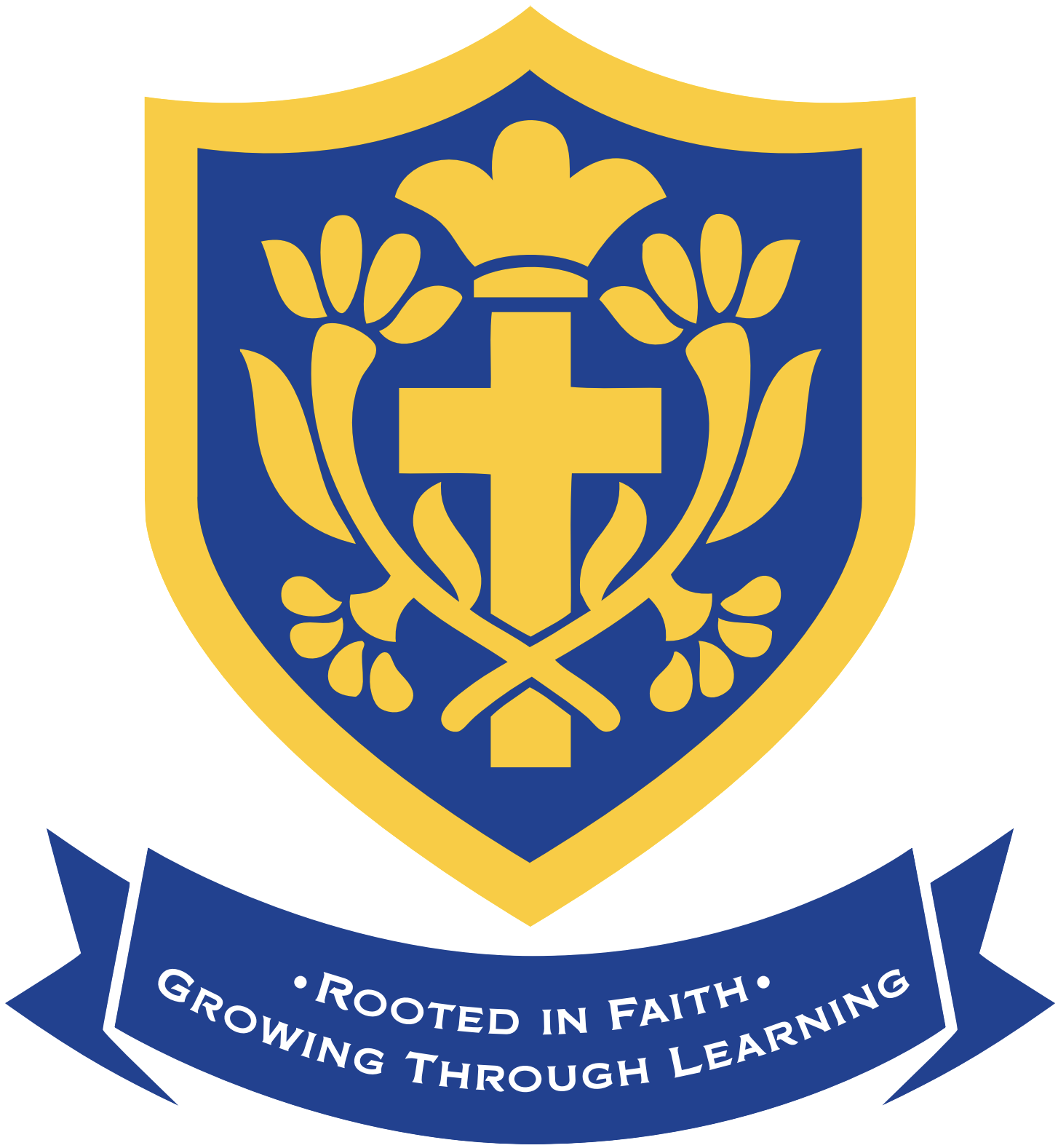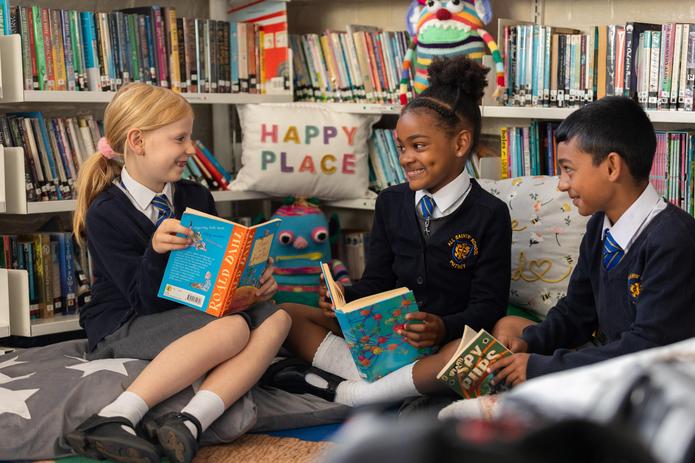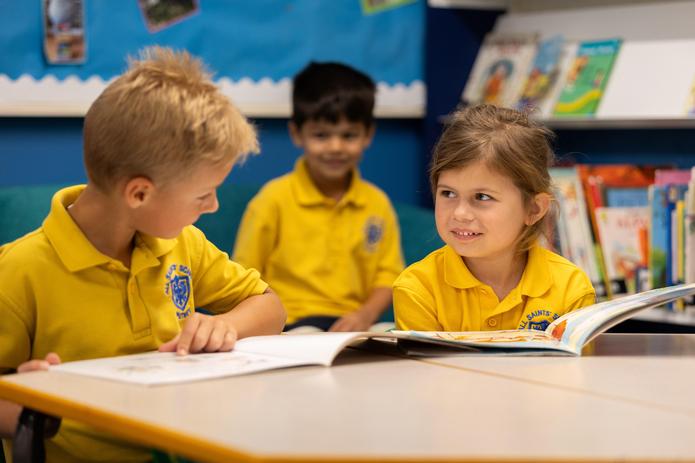English
Theological Underpinning
The Bible has inspired many authors. Works by C.S. Lewis, T.S. Eliot and many more show us that writing can re-tell but also re-imagine and make further sense of the Christian story. In doing so, literature which draws on Christian narratives, themes or symbolism can ask searching questions of the existence and the nature of God. It can also explore the journey of faith in more modern contexts. Stories of many forms, verses, song, and letters are the material of the Bible and have inspired much literature, Christian or otherwise. The telling of stories is essential to Christians; it is part of giving witness to God, of sharing the journey or lessons of faith with others.
NC Programme of Study Aims
The overarching aim for English in the national curriculum is to promote high standards of language and literacy by equipping pupils with a strong command of the spoken and written word, and to develop their love of literature through widespread reading for enjoyment. The national curriculum for English aims to ensure that all pupils:
- read easily, fluently and with good understanding
- develop the habit of reading widely and often, for both pleasure and information
- acquire a wide vocabulary, an understanding of grammar and knowledge of linguistic conventions for reading, writing and spoken language
- appreciate our rich and varied literary heritage
- write clearly, accurately and coherently, adapting their language and style in and for a range of contexts, purposes and audiences
- use discussion in order to learn; they should be able to elaborate and explain clearly their understanding and ideas
- are competent in the arts of speaking and listening, making formal presentations, demonstrating to others and participating in debate.
Curriculum
At All Saints’ we aim for excellence in English throughout the school. We aim to develop pupils’ abilities within an integrated programme of Speaking & Listening, Reading & Writing.
Our aims for pupils leaving All Saints’ at the end of Year 6 are:
- reading and writing with confidence, fluency and understanding, using a range of independent strategies to take responsibility for their own learning including self-monitoring and correcting their own errors;
- with a love of reading and a desire to read for enjoyment;
- with an interest in words and their meanings; developing a growing vocabulary in relation to grammatical terminology;
- understanding a range of text types, media types and genres;
- able to write in a variety of styles and forms appropriate to the situation;
- using their developing creativity, imagination, inventiveness and critical awareness;
- having a suitable technical vocabulary to articulate their responses in any discussion.
At All Saints’ we have several established approaches to help us achieve these aims. Here are some of them.
Early Reading and Phonics
We teach children to read through reading practice sessions three times a week. These are taught by a fully trained adult to small groups of approximately six children. We use books matched to the children’s secure phonic knowledge. Reading for pleasure books also go home for parents to share and read to children. We use Little Wandle Letters and Sounds, a DfE approved systematic synthetic phonics (SSP) programme, from Nursery to Year 2, with extra support in KS2. Home reading books are matched to phonics stages.
Parent Readers
We are fortunate to have the support of a large group of parent readers who read with pupils across Reception and KS1 on a regular basis. This means that pupils are continuously heard reading.
Learn to Love to Read
Learn to Love to Read is a local charity whose services we use to train parents new to phonics how to support their child at home with the starter steps to reading and also how to grow those all important comprehension skills.
Rapid Read
We identify pupils from Year 2 up to Year 6 who will benefit from extra support in their reading comprehension or fluency. These pupils have reading session with an adult 3 times a week and can access online content from home.
Taught Sessions for Comprehension, Grammar, Spelling and Handwriting
KS2 are taught the finer intricacies of tackling comprehension in a whole class taught session every week. They also receive a standalone grammar session. Spelling patterns and rules are also taught in the same way, as is handwriting.
Shakespeare Week
We are very pleased with a growing tradition of running a Shakespeare Week at All Saints’. We follow the lead set by the Shakespeare Birthplace Trust and every year focus on a different Shakespeare play. Each year group accesses the play at an appropriate level. We have had monologues (most notably the Seven Stages of Man) and extended writing through to matching characters from plays to suitable football positions. We all of course look forward to the dressing up.
Book Week
No self-respecting primary school will skip World Book Day. We tie this in to Book Week. The focus for this week is strongly class based and hopes to enrich writing with a short sharp focus on books which teachers love and where they can share their passion for a particular book or author with their class.
Whole School Writing Progression Display
Every year staff agree on a whole school writing task to showcase an area of writing, whether it is grammar in writing, a particular genre or even the writing process. This highlights the progression through the school to staff and visitors, but also to children and stimulates a growth mind set.
Debating (MUNGA)
The school enters a team for the annual Model United Nations General Assembly debating competition, to develop debating skills in pupils where the school feels this might benefit certain individuals. All Saints’ has been very successful in the past, reaching the final round often and in 2016 being joint winners of the Best Debating Skills award. The team, working with Earlsfield Primary School, subsequently represented the Borough of Wandsworth in the English Speaking Union London finals and came second!
Word of Mouth Performance Poetry Competition
Speaking of a different kind is experienced by the pupils who are part of the teams who have entered Wandsworth’s annual KS2 Performance Poetry competition. Individual and group competitors perform poems to an audience of several other schools and for a panel of expert judges. Participation in the competition has fostered a keen love of poetry across the school.
Writing Competitions
The school will enter for writing competitions on an ad hoc basis. We are very aware that writing presently requires strict evidence of age related expectations and that this often leaves creativity unrewarded. Writing competitions, like the Wicked Young Writers Award, often promote just this.
Spelling
We test spelling weekly and incorporate the teaching of spelling rules in general class teaching.
|
|
|
Handwriting Videos
Pencil Grip Song
A helpful song for teaching how to hold your pencil.
Phonics Videos
-
Phonics Video How We Teach Blending
-
Sharing a Phonics Book with your Child Advice on how to share a book with your child
Long Term Planning and Skills Progression
- Whole School Reading Progression Map
- Whole School Writing Progression Map
- Whole School Handwriting Progression Map
- Whole School SPAG Progression Map
- Whole School Spoken Language Progression Map


